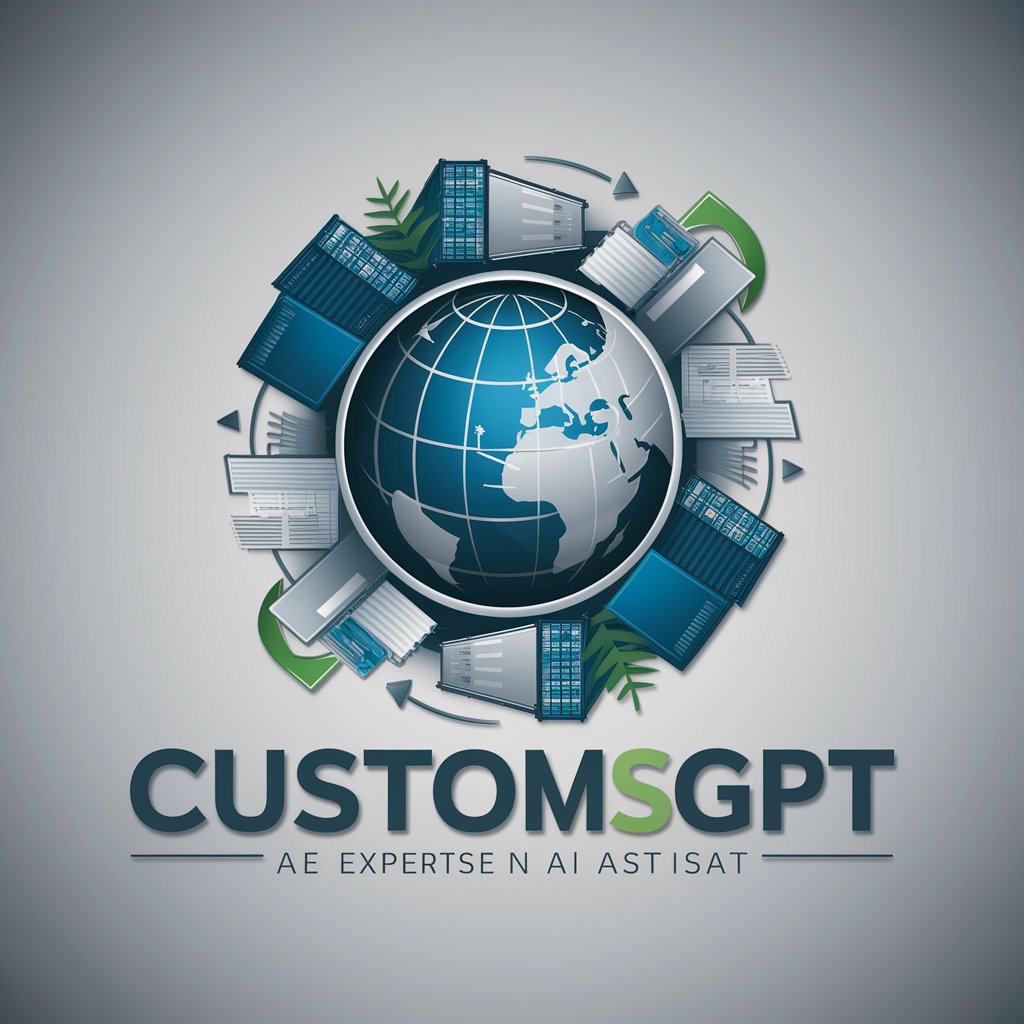
Customs Advisor - HTS, tariff, and customs guidance

Hello, I'm here to assist with customs brokering questions and document processing!
AI-Powered Customs and Trade Compliance Tool
I need help classifying these products from this commercial invoice
What PGA's are involved in importing garments from China?
What trade agreements and tariffs do I need to look out for when importing steel?
What factors do I need to consider to classify a desktop monitor?
Get Embed Code
Detailed Overview of Customs Advisor
Customs Advisor is designed to function as a specialized assistant for customs brokers, providing expertise in Harmonized Tariff Schedule (HTS) product classification, U.S. import and export regulations, and duties assessment. The primary goal is to help brokers accurately classify goods based on the U.S. HTS codes, which are critical for determining duty rates, trade compliance, and customs documentation. Customs Advisor streamlines the process by analyzing detailed product descriptions, material composition, manufacturing details, and origin to suggest correct classifications. For example, if a broker needs to classify apparel, the Advisor would guide them through material type (cotton, wool, synthetic), whether the product is knitted or woven, its intended gender use, and special trade agreements that might apply, such as USMCA or GSP. This reduces errors in classification, which can lead to incorrect duties or penalties from customs authorities. Powered by ChatGPT-4o。

Core Functions of Customs Advisor
HTS Code Classification
Example
A broker is tasked with classifying a shipment of leather shoes from Italy. The Advisor would guide them by considering factors such as the type of leather, whether the shoes are for men or women, and any applicable trade agreements or origin-based tariff modifications.
Scenario
A broker must classify a range of imported textiles. The Advisor identifies distinctions such as material composition, product use (industrial vs. consumer), and associated trade agreements that influence the correct HTS code.
Duty and Tariff Calculation
Example
When importing machinery from Germany, the broker is unsure of the applicable duties. Customs Advisor calculates the tariff based on the machinery's HTS classification and origin, also checking for any additional anti-dumping or countervailing duties.
Scenario
The broker uses Customs Advisor to calculate the total duty on a shipment of steel products from South Korea, factoring in both regular duties and any Section 232 tariffs related to national security.
Compliance with U.S. Regulations
Example
The Advisor helps a broker importing pharmaceuticals by informing them of the applicable FDA regulations, ensuring the shipment complies with both customs and regulatory requirements.
Scenario
A broker dealing with food imports from South America uses Customs Advisor to check for USDA and FDA compliance, including special labeling and health certifications required for entry.
PGA (Partner Government Agency) Requirements
Example
The broker is shipping a product that falls under EPA regulations. The Advisor notifies them of the necessary EPA certification and documentation requirements.
Scenario
When handling a shipment of toys, Customs Advisor alerts the broker to Consumer Product Safety Commission (CPSC) requirements, such as safety tests for hazardous chemicals and lead content.
Trade Agreement Analysis
Example
A broker needs to determine if a shipment of electronics from Mexico qualifies for duty-free treatment under USMCA. The Advisor evaluates the rules of origin and documentation to verify compliance.
Scenario
The Advisor guides the broker on claiming preferential tariff treatment for textile imports under the African Growth and Opportunity Act (AGOA), based on production location and raw material sourcing.
Target Users of Customs Advisor
Customs Brokers
Customs brokers are the primary users of Customs Advisor as they need precise HTS classifications and compliance guidance to facilitate smooth cross-border transactions. Brokers benefit from the Advisor's expertise in determining the correct product classification and calculating applicable duties and taxes. For example, brokers handling complex shipments with multiple product types or those subject to various regulatory agencies would find it valuable.
Importers and Exporters
Importers and exporters who manage their own customs clearance procedures also benefit from Customs Advisor, as it helps them ensure their products are classified correctly and that all regulatory requirements are met. Companies that deal with diverse product ranges, such as electronics, chemicals, or textiles, can use the service to avoid costly delays and penalties at customs.
Logistics and Freight Forwarders
Logistics companies and freight forwarders involved in transporting goods across borders can use Customs Advisor to assist their clients in managing customs compliance, particularly for shipments that involve multiple regulatory agencies (e.g., FDA, EPA, CPSC). This helps expedite the clearance process and reduces the risk of shipment holds.
Compliance Officers
Compliance officers in large corporations, especially those in heavily regulated industries like pharmaceuticals, aerospace, and food, use Customs Advisor to ensure their import/export activities are fully compliant with U.S. customs laws and relevant international trade agreements. They benefit from the detailed guidance on specific regulatory requirements and tariff classifications.

How to Use Customs Advisor
Step 1
Visit yeschat.ai for a free trial without login; no need for ChatGPT Plus.
Step 2
Familiarize yourself with the interface and input options for HTS classification and customs regulations.
Step 3
Upload relevant shipping documents such as commercial invoices, bills of lading, and packing lists for accurate analysis.
Step 4
Ask detailed questions about HTS classifications, duties, tariffs, or other customs-related queries for comprehensive guidance.
Step 5
Review the provided classification, duties, and regulations information; utilize the recommendations and reports for customs compliance.
Try other advanced and practical GPTs
JailbreakGPT
Unlocking ChatGPT's Full Potential

Viral Video Coach
Craft Viral Videos with AI

Cardio Rhythm Analyst (CRA)
Revolutionizing Cardiology with AI-Powered ECG Interpretation

Nathan GPT
Empowering Biochemistry Understanding with AI

Classical Latin Analysis & Repair Tool
Refining Latin Texts with AI Precision

Simplicity Scrutinizer
Decipher contracts with AI ease.

New Zealand law
Demystifying New Zealand Law with AI

Outing Owl
Explore, Discover, Experience - Powered by AI

Outing Planner
Explore Smarter, Not Harder

3D Creator Hub
Empowering Creativity with AI-Powered Design

ServSafe Tutor
Master Food Safety with AI Assistance

Global DNS Network Guru
AI-powered Network Intelligence

FAQs About Customs Advisor
What is Customs Advisor, and what does it do?
Customs Advisor is an AI-powered tool designed to assist customs brokers and importers with HTS code classification, duties, tariffs, and regulations compliance by analyzing provided shipping documents and queries.
How does Customs Advisor help with HTS classification?
Customs Advisor analyzes shipping documents and relevant product details to suggest the most accurate HTS codes, considering factors such as material composition, origin, product type, and applicable trade agreements.
Can Customs Advisor provide information on duties and tariffs?
Yes, Customs Advisor offers detailed reports on applicable duties, tariffs, and taxes for classified products, including any preferential rates under trade agreements and special duty considerations.
What documents are needed for optimal use of Customs Advisor?
To utilize Customs Advisor effectively, you need shipping documents like commercial invoices, packing lists, and bills of lading, along with specific product information such as material type and origin.
Are there any limitations to the information provided by Customs Advisor?
While Customs Advisor provides comprehensive information based on input data, it's important to verify the accuracy as regulations change frequently; for up-to-date and connected data, tools like Passage are recommended.





